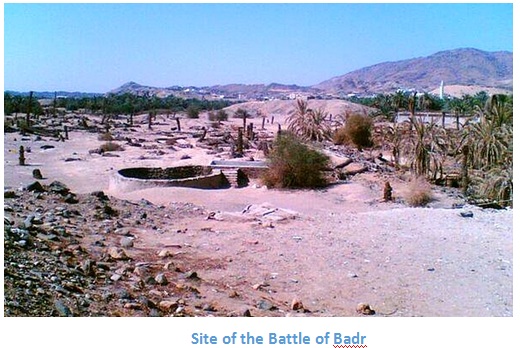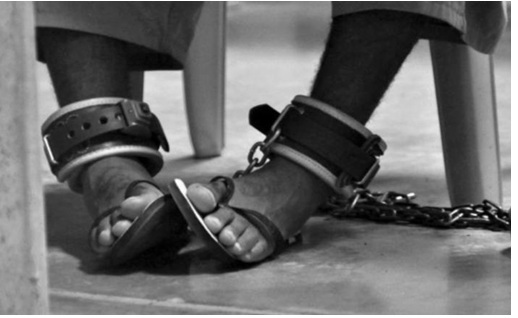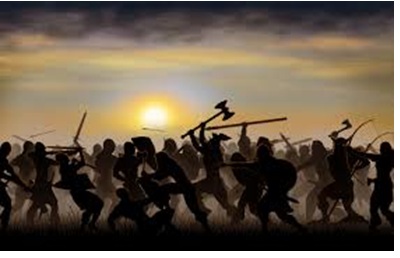Bilal, the Outrunner (Part-8)

Beginning with the previous seven issues of Young Muslim Digest, the life of Bilal bin Rawaha, the famous Companion of the Prophet, is being serialized in this column every month. Presented herein under is the eighth installment in this series taken from the brief, but significant, biography by SYED IQBAL ZAHEER.
Middle Eastern Travels
“The first time I heard the Adhan, I was moved by a feeling so strange but powerful that defies description. I asked the interpreter what the Caller was saying. He told me, ‘He is saying there is no god save One.’ I asked him what it was he was saying subsequently. He told me, he says, ‘O sleepers! Have trust in Him Who does not sleep!’” `Aqqad also quotes La Fcadio Hearn as saying: “Without any doubt the serene Muslim call to Prayer, especially when one happens to hear it for the first time, has a tranquilizing effect upon the heart.”
A Fit Recompense
The second Islamic year after Hijrah, stands out for the eventful battle of Badr. The Makkans were itching for it ever since the Muslims migrated to Madinah. As a matter of fact, what is called as migration was, in reality, an expulsion. And so the Muslims had the right to fight back their way into Makkah. Specially so, in view of the fact that the Makkans had expropriated the property they had left behind. But, it was not war the Muslims were eager for. They had experienced enough violence in Makkah.
All they wanted at Madinah, was to be allowed to lead a peaceful life of their own design without any outside interference. But such were not the designs of the Quraysh. They began to raid the Madinan cattle and threaten its population, Muslims and non‑Muslims alike, with extirpation. The Muslims had to answer forcefully. As a result, a series of battles started. The one at Badr was the first.
Bilal also participated in that “one of the smallest battles in the history of mankind, but one of the most important in its annals for its consequences.” Although the Makkans had declared total war on the Muslims, this particular battle took place for no sound reason. It could have been avoided. For, it was true that in retaliation to the Makkan raid of Madinan cattle, the Prophet (saws) had tried to lay his hands on a Makkan trade caravan that was returning from Syria, but the Muslims had missed the caravan by miles and days.
Before the Makkans could reach Badr, the caravan was in safe territory, far beyond the reach of the Muslims. And the Quraysh knew about it. Those of them that had come out in its defense ought to have returned peacefully to Makkah, as suggested by some of their own men who objected to the confrontation, on grounds that their objective had been achieved. But the fact is, the great majority of them were warlike men who hadn’t displayed their valor in a battle for quite a spell. And  so, as with every warlike people who have acquired military strength, they were itching for a fight and impatient to go for a kill. If a pretext had not arisen, they’d have worked up one.
so, as with every warlike people who have acquired military strength, they were itching for a fight and impatient to go for a kill. If a pretext had not arisen, they’d have worked up one.
The two armies, if it is right to call the Muslim force that was accompanying the Prophet an army, met at Badr, a sleepy town some 200 kilometers from Madinah. The Makkans were there with all their strength, and the Muslims with all their weakness. Here, for the first time, the persecuted faced the persecutors. The former slaves faced their former tyrannous masters. Fathers faced their sons, uncles their nephews and kin, kin. For many, it was a strange situation, and many were unwilling to fight, especially the Muslims, who hadn’t set out of Madinah prepared for a war.
So a number of people from both sides preferred withdrawal to a showdown, but Abu Jahl foiled all attempts at peace. How many proud leaders haven’t there been that have led their nations to swift destruction?
It is strange, but true. The unbelievers see God as needing assistance of others for the execution of His will: supposed deities in the clouds and priests on the earth. The God of their belief interferes seldom, and only in the affairs of the individuals, leaving nations to manage their affairs as best as they can by themselves – without any guidelines from above. That’s where their leaders discover a void. They exploit a crisis, evoke national pride and lead the masses into battles to meet head on with their destruction!
They say they can’t successfully explain the causes of the first and second world wars!
Will they ever?
So they met head on: the two, the pagans and the Muslims. One believing in One God, the sole Lord of the universe, surrendering their will to Him and pursuing the way of life that pleased Him, and the other, equally, if not fanatically, believing in the historical truths as manifested in the mysterious appeal of the deities upon their virgin souls!
The two faiths, contradictory to each other, made all the difference in the results of the battle: one was fighting in the way of God and the other in the way of the Devil.
It was, however, as we have said, a strange situation for both. Kin facing kin; especially for the Muslims. It wasn’t easy for them to be fighting those whom they hated to see in the battle field lined up on the opposite side. “Only if they hadn’t come,” they would have wished. But now there was no escape. For, having come so far, facing each other with swords in their hands, the consideration that came first was that of faith. Does the faith come first or the kin?
For the Muslims at Badr, when it came to Allah (swt), Islam and Muslims, the kindred didn’t matter. It was faith that came first. There was never a second thought. For them, it was a simple question … straight logic. Do you believe in the Qur’an? Do you believe in its words? … Do you really? … Or do you not? … To whom is your allegiance due: first and foremost? To your country? Your society? Your family? Your wife and children? Or, to the Lord, your God?
Do you belong to the mainstream of believers trickling down since the time of Adam? Or do you belong to the small or big pond that must – sooner or later – dry up. It has to dry up in the scheme of God: you willing or unwilling; humanity willing or unwilling. For the world is God’s. He is guiding it to an end. The world will go His way. You aren’t going to change its course. You only decide to be with God’s forces or with forces opposed to Him. Your choice is not going to alter the  outcome. Allah’s forces will be victorious. If not in this battle, in the next. If not in your life‑time, in somebody else’s. If not in this century, in the next. But it is going to prevail.
outcome. Allah’s forces will be victorious. If not in this battle, in the next. If not in your life‑time, in somebody else’s. If not in this century, in the next. But it is going to prevail.
So choose your alliances. And your choice will speak of your faith and not the words that you pronounce – and quite solemnly too! But you forget, or tend to forget even after you have learnt, that words are empty. Deeds lend them weight. Deeds are like sponge. The more water in it, the weightier it gets. And the water of the sponge of deeds is sincerity with Allah (swt). The more sincere you are, the more the same volume of sponge will weigh! Words are empty, weightless, unworthy.
So choose your alliances. Choose your religion. And the choice is not always in the battle‑fields. It has to be made every day, every hour.
The first generation of Muslims had chosen their religion. They hadn’t inherited faith. Can faith be inherited? They had opted for it in the full light of the day. It was a hard choice that had demanded a hard price. And they had paid that price: the price in pain, agony, in days darker than the nights, in persecution, in self‑respected men being dragged around by the street boys, in proud men being abused in public and in decent people being misbehaved with before the multitudes.
They had paid their price in fear during the day and agony in the night. Was there a way out then, at that time? Was there any hope of the survival of faith or the faithful at that time? No. There wasn’t as much hope as of the Eskimos becoming a super power within a couple of years. Yes, there were promises of ultimate triumph. But when? Probably after them.
Yet, they had hung on, obtrusively, rugged‑heartedly … sincerely.
The believers at Badr were people who had made their choices and had paid the price for those choices. They left an example to be long followed. Following them, Muslims in every age have made their own choices to prove that theirs is not an inherited faith. It has been earned.
History tells us that whenever calls have been made across the centuries, some have always responded positively and appeared at the examination tables. Their acceptance of the call meant they stood against the currents: the powerful currents that often swept them off their feet. But they hung on, clutching at whatever they could. They had the pressure of the world upon them.
They were called fundamentalists, extremists, fanatics and what else not. They became strangers to their friends, relatives, even their own wives and children. They were pitied for their choices, laughed at, jeered, persecuted, thrown out of jobs and into prisons. Some of them were executed. But they stayed firm and squarely faced the challenge thrown at them. They didn’t run away, didn’t ask for mercy. They turned into reality the fiction of the death on the cross. They didn’t flinch, didn’t weaken down:
“Of them were some who had made true their promises and some who are waiting (for an opportunity to arise)” (ch.33 v.23)
So the Muslims at Badr were those that had made their choices. They were facing an army three times larger in number than their own. As for arms, they were almost empty-handed when compared to their enemies. The Makkans were armed to their teeth. The Muslims were so short of arms that they began the battle by throwing stones at the enemy. “As if you can win a war with stones,” the skeptic, both believing as well as the unbelieving, would chuckle. But they forgot who was throwing the stones. Hadn’t David shot a stone before?
There was another aspect that cannot be lost sight of, of which the Muslims were well-aware. The Muslims were weak only in material power. In terms of moral and spiritual power, they were the strongest single group on earth at that time. And moral power, they knew, is undefeatable, indestructible.
 Therefore, for the Makkans the battle was lost almost from the start as had one Makkan himself predicted. There was no hope for them. God was angry with them. Victory was impossible. Muslims were right on top of them assaulting them from all sides. They were soon in complete disarray. While some fought on bravely, others gave themselves up as prisoners as many began to flee. The Muslims pursued them … cutting them down.
Therefore, for the Makkans the battle was lost almost from the start as had one Makkan himself predicted. There was no hope for them. God was angry with them. Victory was impossible. Muslims were right on top of them assaulting them from all sides. They were soon in complete disarray. While some fought on bravely, others gave themselves up as prisoners as many began to flee. The Muslims pursued them … cutting them down.
It was in this bedlam that Bilal spotted his former master, Umayyah ibn Khalaf. He was an unwilling participant who had originally decided to stay back. But it was `Uqba b. Abi Mu`eet and Abu Jahl who had enlisted him, by cunning. When they had learnt of Umayyah’s unwillingness they had gone to him with perfume and kohl.
`Uqba pushed forward perfume and told him: “Here! Take it. This is for you. For you are a woman!”
Then Abu Jahl thrust forward kohl (finely ground black paste applied to the eyelids for beautification) at him and said: “Here. Take it and apply to your eyes. For you are a woman!”
Umayyah grunted, cursed them, but had to join in. (Rijal Haul al‑Rasul)
Another thing could have bothered him. His brother, Ubayy b. Khalaf, had once been told by the visiting Sa`d b. Mu`adh that the Prophet (saws) had predicted that he would kill him.
“Did you hear him say that, yourself?” Ubayy had asked.
“Yes,” Sa`d had said.
Now, although neither Umayyah nor his brother, Ubayy, had testified to the faith, they took this prediction seriously. They couldn’t have been very willing to take chances. (Bukhari, Kitab al‑Maghazi)
But once in, Umayyah proved to be a useful participant, at least until the action began. He put into service the best camel that could be purchased in Makkah, at the fabulous price of 300 Dirhams, which was no mean figure then, and later, as the army marched across, he was one of the nine leaders who slaughtered ten camels a day, in turns, to feed the army.
There were two more reasons why he wasn’t very optimistic of the outcome of the battle. One, `Atika, the daughter of `Abdul Muttalib, who was still in Makkah, had dreamt those days that something terrible was going to befall the Makkans. And two, when he had consulted the deities whether it was wise for him to participate, by throwing the lots, the answer he got from the dumb things was a firm “No.” And although he would have known that those earthen idols could neither be right nor wrong, Umayyah, perhaps, wanted to use the negative answer as a pretext for staying back. But `Uqba ibn Abi Mu`eet and Abu Jahl proved to be smarter.
So the unwilling participant, having contributed heavily to the provision, adopted a low profile during the battle and sought to be taken a prisoner when he saw the tables turn. His captor was `Abd al‑Rahman ibn `Auf who, admittedly, had his eyes more on the expensive coat of mail his prisoner wore, rather than the prisoner himself. He was leading them away … he and his son … when Umayyah’s destiny spotted him.
 “Get this enemy of God, O Believers,” cried out Bilal in great anxiety as he spotted him. “May I not live if he lives!”
“Get this enemy of God, O Believers,” cried out Bilal in great anxiety as he spotted him. “May I not live if he lives!”
This was Bilal’s voice. It couldn’t be neglected. Everyone who heard him, answered with his sword. In a minute Umayyah b. Khalaf and his son were surrounded. `Abd al‑Rahman protested and even pleaded with Bilal to spare his captives. But Bilal repeated his words, “May I not live if this man lives.” And if it was Bilal saying that, there was no listening to others, unless it was the Prophet himself.
Someone struck at Umayyah’s son. The sword returned with its prize. It was the shank. At this Umayyah let out a shriek, which was so loud and piercing that it shook the hills around. It was the agony of a father crying out for a piece of his heart, his son. But it was too late for him to demonstrate that he had a kind spot in his heart. It had no soft spot for Bilal anyway. In a moment, he, too, lay in the dust. Bilal and Khubayb b. Yasaf had despatched him to Hell. The information that Bilal killed Umayyah is in Isti`ab. Waqidi has added the name of Khubayb.
Hell! A fit recompense for him who chose to reject the Prophet and tortured a believer in him. A believer who? Bilal!
Not only he. All those that had once raised their heads high in pride and arrogance lay in the dust that day. In all, seventy of them.
And `Abd al‑Rahman ibn `Auf used to say referring to the incident: “May Allah show mercy to Bilal! He neither let me have the prize of the captives, nor the coat of mail!”
As opposed to his former, hefty, master, the frail-looking Bilal played an active role in the battle. According to a report it was Bilal who killed Zayd ibn Mulayyis that day. He also took one lion, who proved to be a chicken, prisoner. It was Umayyah b. Abi Hudhaifah ibn al‑Mughira, a namesake of his former master and another pride of the Quraysh army.
When the battle was over, the Prophet (saws) ordered the carcasses of the Makkans thrown into a pit and covered with earth. They were dragged by their feet and given a push down the pit. But when they attempted to drag Umayyah’s corpse, surprisingly, they found it had begun to decay. When they tried to drag him – and he was a heavy man – flesh began to fall apart. It was strange that the corpse should have begun to decompose within a couple of hours! And of none other save Umayyah?!
The Prophet (saws) ordered them to leave his corpse where it was.The same has been reported of the communists in Afghanistan, whose corpses alone would begin to decompose within hours, despite snow around. Another, similar nature of Allah’s punishment of the dead, comes to mind. It is in Tirmidhi.
`Imarah b. `Umayr reports:
“When the head of `Ubaydullah b. Ziad (the killer of Hussain) was brought among others and displayed in a mosque, after he was killed by the forces of Ibrahim b. Ashter in Mosil, I went up there. When I entered, I heard the people crying out excitedly, `Here it is! It’s come back!’ I closed in on to see a thin short snake slithering between the eyes, curling itself through the nostril into Ziad’s head and, after a while (re‑emerging from his mouth). Then it disappeared. After a while the people were again saying, `Here it is. It’s come back!'”
____________
(To be continued)

